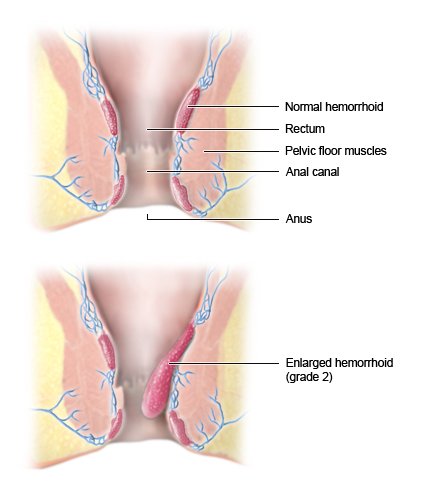Abramowitz L, Weyandt GH, Havlickova B et al. The diagnosis and management of haemorrhoidal disease from a global perspective. Aliment Pharmacol Ther 2010; 31 (Suppl 1): 1-58.
Acheson AG, Scholefield JH. Management of haemorrhoids. BMJ 2008; 336(7640): 380-383.
Alexander K, Daniel WG, Diener HG et al. Thiemes Innere Medizin (TIM). Stuttgart: Thieme; 1999.
Alonso-Coello P, Guyatt GH, Heels-Ansdell D et al. Laxatives for the treatment of hemorrhoids. Cochrane Database Syst Rev 2005; (4): CD004649.
Deutsche Gesellschaft für Koloproktologie (DGK). Hämorrhoidalleiden (S3-Leitlinie, in Überarbeitung). AWMF-Registernr.: 081-007. 2019.
Hahn EG, Riemann FJ. Klinische Gastroenterologie. Stuttgart: Thieme; 2000.
Joos AK, Herold A. Hämorrhoidalleiden. Neue konservative und operative Therapien für ein weit verbreitetes Leiden. Der Gastroenterologe 2010; 5: 326-335.
Klauber J, Geraedts M, Friedrich J et al. Krankenhaus-Report 2013. Mengendynamik: Mehr Menge, mehr Nutzen? Stuttgart: Schattauer; 2013.
Lohsiriwat V. Hemorrhoids: from basic pathophysiology to clinical management. World J Gastroenterol 2012; 18(17): 2009-2017.
Mounsey AL, Halladay J, Sadiq TS. Hemorrhoids. Am Fam Physician 2011; 84(2): 204-210.
Ng KS, Holzgang M, Young C. Still a Case of "No Pain, No Gain"? An Updated and Critical Review of the Pathogenesis, Diagnosis, and Management Options for Hemorrhoids in 2020. Ann Coloproctol 2020; 36(3): 133-147.
Pschyrembel Online. 2025.
IQWiG health information is written with the aim of helping people understand the advantages and disadvantages of the main treatment options and health care services.
Because IQWiG is a German institute, some of the information provided here is specific to the German health care system. The suitability of any of the described options in an individual case can be determined by talking to a doctor. informedhealth.org can provide support for talks with doctors and other medical professionals, but cannot replace them. We do not offer individual consultations.
Our information is based on the results of good-quality studies. It is written by a team of health care professionals, scientists and editors, and reviewed by external experts. You can find a detailed description of how our health information is produced and updated in our methods.


